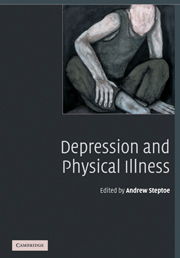Book contents
- Frontmatter
- Contents
- List of contributors
- Preface
- Part 1 Introduction to depression and its determinants
- Part 2 Depression and specific health problems
- 3 Depression and the development of coronary heart disease
- 4 Depression and prognosis in cardiac patients
- 5 The management of depression in patients with coronary heart disease
- 6 Depression and physical disability
- 7 Chronic pain and depression: twin burdens of adaptation
- 8 The interrelationship of depression and diabetes
- 9 Depression and chronic fatigue
- 10 Cancer and depression
- 11 Depression and obesity
- Part 3 Biological and behavioural processes
- Part 4 Conclusions
- Index
- References
11 - Depression and obesity
from Part 2 - Depression and specific health problems
Published online by Cambridge University Press: 17 September 2009
- Frontmatter
- Contents
- List of contributors
- Preface
- Part 1 Introduction to depression and its determinants
- Part 2 Depression and specific health problems
- 3 Depression and the development of coronary heart disease
- 4 Depression and prognosis in cardiac patients
- 5 The management of depression in patients with coronary heart disease
- 6 Depression and physical disability
- 7 Chronic pain and depression: twin burdens of adaptation
- 8 The interrelationship of depression and diabetes
- 9 Depression and chronic fatigue
- 10 Cancer and depression
- 11 Depression and obesity
- Part 3 Biological and behavioural processes
- Part 4 Conclusions
- Index
- References
Summary
Introduction
It is estimated that at least 300 million people worldwide are obese and two to three times more are overweight [1]. Rates vary enormously from country to country, but the situation in the USA is particularly alarming: current figures suggest that over 65% of US adults are overweight, of whom over 30% are obese (body mass index [BMI] ≥ 30) and almost 5% are severely obese (BMI ≥ 40) [2]. Although associations between obesity and physical health consequences such as diabetes, heart disease and cancer, as well as all-cause mortality, are well documented [3–6], the psychological impact of obesity remains poorly characterised.
In the heyday of psychosomatics, obesity was believed to be a consequence of either misinterpreting emotional arousal as hunger or using food as a form of self-medication in order to cope with distress [7]. Obese people were assumed to have extensive psychopathology, and the treatment of choice was psychotherapy. However, when larger-scale epidemiological studies were carried out, it became clear that there were no systematic differences in either personality or rates of psychiatric illness between obese and normal-weight adults [8]. With time, the psychosomatic theory lost ground as a basis for management of obesity, but interest in the link with depression has lived on. Recent years have seen evidence that stress is associated with adiposity [9, 10], and both cortisol and leptin have been implicated in linking the hypothalamic-pituitary-adrenocortical (HPA) axis and adipose tissue [11, 12].
Keywords
- Type
- Chapter
- Information
- Depression and Physical Illness , pp. 238 - 262Publisher: Cambridge University PressPrint publication year: 2006
References
- 4
- Cited by

